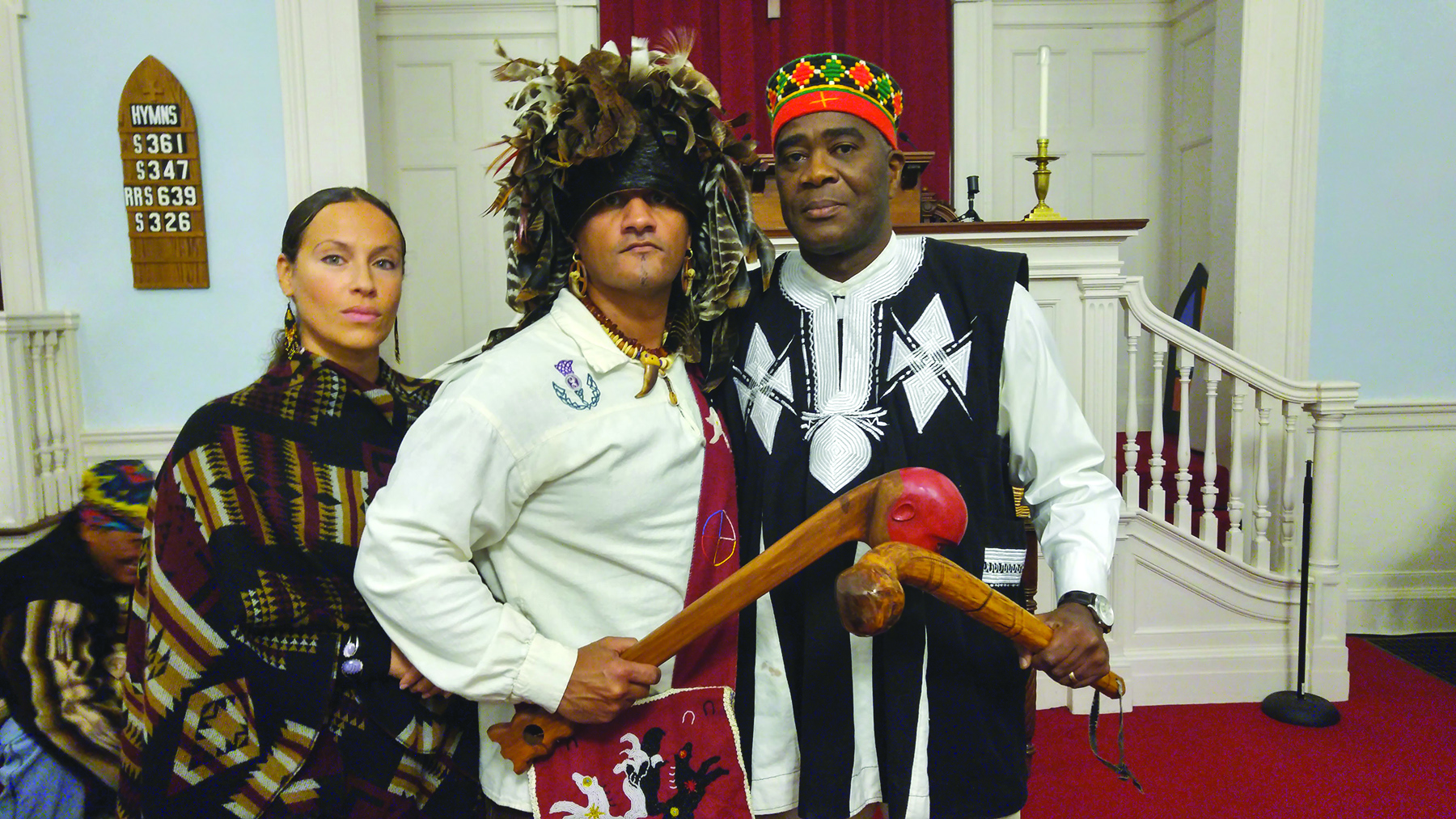The Natick Praying Indian (NPI) tribe continues to play an essential role in Natick’s identity. The tribe, which established the first indigenous Christian church in America alongside Reverend John Eliot, meets in the Eliot Church, 45 Eliot St, the same site the first worshippers used over 300 years ago. Chief Caring Hands bears generations of knowledge, as well as the wisdom of her experiences and connection with God, which she imparts as the leader of the tribe.
Growing Up Native
Traditions and culture were passed down easily to Chief Caring Hands because her parents shared Native heritage. She spent much of her childhood in the woods near their home in Stoughton with her 11 siblings; the family was a community unto themselves. “With that many children, you’ve got a gathering,” she said.
Chief Caring Hands’ mother held the title of Grand Squaw Sachem (Squaw meaning woman, Sachem meaning chief). Her mother was the sitting chief when the Eliot Church congregation welcomed the NPI tribe back in 2012 after three long centuries of absence. This was a monumental and sacred time for the tribe.
“I remember one day when she visited the church,” Chief Caring Hands recalled. “When she left, I was looking out the window smiling at her, and she looked up. I’ll never forget that moment. She later told me, ‘I was so happy to see in our church.’”
The Grand Squaw Sachem later passed the staff on to her daughter, making Caring Hands the new Chief. This role is particularly notable because of the NPI tribe’s role as the first Praying Indian tribe, making way for the 13 others that followed.
Chief Caring Hands desires to see tribe members acknowledge their roles as leaders, while remaining humble and service-hearted. “We want our children to have the pride, and the responsibility and love that goes with that pride, and put them together so that there’s never a vanity in it,” she said.
Seeing Our Brethren
This can be difficult to achieve while managing pain at the same time. Like all Native people, the NPI tribe has experienced unimaginable hardships across generations, most notably the Deer Island Tragedy of 1675, when the tribe was forced into exile in the dead of winter, leaving only 167 survivors.
Another example is the disregard for Native burial sites. Chief Caring Hands feels life and death are so intertwined, that they cannot be treated separately. “No one would ever mow down and dig up a cemetery, and yet, this is what happens with Native people,” she explained. “That’s something that should be thought of.”
She sees this as being indicative of a larger problem, one of visibility.
“It’s tied with people not recognizing that Native people exist,” she continued. “They don’t see the Native people anymore, so they don’t think of them.” This deeply affects the tribe, and they carry the pain of these experiences with them.
The NPI tribe looks beyond this burden to remedy what wrongs they can, such as winter clothing and backpack drives, which provide supplies for struggling Native reservations.
“This is the second commandment of loving your brother,” she said, referencing Jesus’ words in Matthew 22:37-40. “We want our children to see this, so that they will do the same.”
Enabled Leadership
Chief Caring Hands also thinks of the children in the context of the distinctive qualities of her leadership as a Native person, a woman and as person with a disability.
She once used a cane to assist her mobility. “I would tell the children, ‘You young girls, I want you see that a woman can be a chief. You see my stick here? It’s not just a stick. It helps me walk. I want you to know that if you have a disability, you can still do things,’” she recalled.
Once she began using a wheelchair, a new revelation occurred. “I had a saying that came to me. I found that in the wheelchair, I didn’t have that far to fall,” she said. “Now I feel it’s part of the stage the Father has put me in right now.”
Chief Caring Hands sets an example of possessing inner strength and identity, while also accepting and loving others as children of God. “People focus on the differences, but the great equalizer is that everybody’s blood is red,” she said.
Learning More
In 2010, Chief Caring Hands published “The Words of the Father,” a transcription of messages she hears from God. “In the Bible, God was always talking to people. The Native person speaking to the Creator is natural and normal,” she said of her experiences. To inquire about purchasing the book, email prayingindians@natickprayingindians.com.
Readers can also buy the documentary “Praying Town,” created by local filmmaker Zadi Zokou of Zokou Productions, which Chief Caring Hands described as “the best documentary ever done on our people.” For information, email zokouzadi@hotmail.com.
The NPI tribe holds services at the Eliot Church at 2 p.m. on the second Saturday of every month, and hosts gatherings in Natick, such as the annual Powwow in September. All are welcome to these events, and the tribe invites the community to learn about and celebrate their heritage.
Part I of this article series on the history of the tribe can be found in the May 2017 edition of Natick Local Town Pages. To learn more about the Natick Praying Indians, visit www.natickprayingindians.org.

Issue Date:
June, 2017
Article Body:
